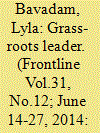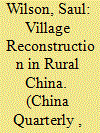| Srl | Item |
| 1 |
ID:
131144


|
|
|
|
|
| Publication |
2014.
|
| Summary/Abstract |
Gopinath Pandurang Munde (1949-2014) was a simple man comfortable in his rural roots. A stranger to Machiavellian Political machination, he owed his success to sheer determination.
|
|
|
|
|
|
|
|
|
|
|
|
|
|
|
|
| 2 |
ID:
165003


|
|
|
|
|
| Publication |
New Delhi, Cambridge University Press, 2019.
|
| Description |
x, 275p.hbk
|
| Standard Number |
9781108486552
|
|
|
|
|
|
|
|
|
|
|
|
Copies: C:1/I:0,R:0,Q:0
Circulation
| Accession# | Call# | Current Location | Status | Policy | Location |
| 059624 | 320.95491/MCC 059624 | Main | On Shelf | General | |
|
|
|
|
| 3 |
ID:
114855


|
|
|
|
|
| Publication |
2012.
|
| Summary/Abstract |
This article examines the profound transformation market reforms have brought to the leadership of the Chinese Communist Party's (CCP) rural grassroots organizations. Focusing on the political rise of private entrepreneurs and other economically successful individuals who recently obtained village Party secretary appointments in a north China county, the article explores their differing promotion channels, power bases, political resources and motivations to take up the CCP's grassroots leadership position. It demonstrates that the variety among the new entrepreneurial Party secretaries - from large factory owners to de facto farm managers - shaped the network resource, factional affiliation and socio-political capital they rely upon to exercise their newly attained power. It also shows the crucial role played by community-based endogenous forces in transmitting the power of economic liberalization into dynamics for the reshuffling of the Communist Party leadership at the grassroots level.
|
|
|
|
|
|
|
|
|
|
|
|
|
|
|
|
| 4 |
ID:
166875


|
|
|
|
|
| Summary/Abstract |
Using examples from village reconstruction programmes in rural China, we show that local cadres often prioritize project visibility over publicized policy goals. While central policies and the academic literature emphasized land reclamation or rural welfare, local cadres – and the projects they designed – tended instead to focus on projecting an image of urban, wealthy villagers. Where such image-driven behaviour is most deleterious to villagers, it can evince opposition. We observe that some areas avoid conflict by making these projects voluntary or adjusting projects to local conditions. However, we provide a case study of a village with strong village leadership, showing that contrary to recent claims that village cadres are increasingly impotent, some maintain the authority to override widespread objections from villagers.
|
|
|
|
|
|
|
|
|
|
|
|
|
|
|
|
| 5 |
ID:
149741


|
|
|
|
|
| Summary/Abstract |
What have we learned from a decade of research on the provision of public goods in the Chinese countryside? This review article surveys the literature in political science, economics and Chinese area studies. It describes the three dominant types of explanations for variation in the quality of public goods: local elections, social sanctioning and economic policies. It then argues that these findings are plagued by a set of common problems. Scholars mean different things when they use the term “public goods,” making their findings difficult to compare. Furthermore, the most common measures of public goods ignore the ways in which local officials manipulate statistics to enhance their career prospects and the interconnected nature of geographic-administrative units in the Chinese state. I suggest some ways to address these problems, and make recommendations for new directions in research on the topic.
|
|
|
|
|
|
|
|
|
|
|
|
|
|
|
|